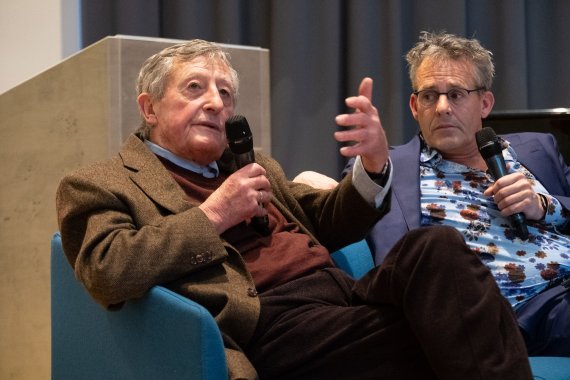Simon Groot, vegetable seed breeder from Enkhuizen and winner of the World Food Prize, visited WUR yesterday. In meeting centre Impulse, he explained to the audience of 200 how his company East-West Seed grew to be the leading seed breeding company in South-East Asia.
The ‘Nobel prize for food’, as the World Food Prize is often dubbed, was awarded to Simon Groot in October 2019. The 84-year old breeder founded his company East-West Seed in 1982 and, in doing so, provided millions of small-scale farmers in Asia with access to seeds adapted to local growing circumstances.
Counsellors
In building his company, which now has five thousand employees, Groot collaborated with dozens of Wageningen researchers for research and training purposes, as well as employing hundreds of Wageningen University graduates. Without the help of counsellors from Wageningen, he would not have made it this far, he stated in Impulse on 9 January.
Vision
Essential to Groot’s success was his company vision. East-West Seed aimed to develop vegetable seed in Indonesia, Thailand and The Philippines; countries that did not have any international seed breeding companies active in 1982. Groot’s primary mission was not to sell, but to do research: What vegetables was the local population eating? What plant characteristics needed improvement and what did the farmers want? ‘You need to know the farmers’ mindset and motivation,’ said Groot. ‘But they won’t give you this information, you need to find it out. Then you need to improve the vegetables and discuss the innovations with the farmers, to see how they feel about it.’
You need to know the farmers’ mindset and motivation, but they won’t give you this information, you need to find it out
It is partly because of this, that East-West Seed invests in the development of knowledge for farmers. The company employs its own agricultural counsellors and has its own market development programmes,’ according to Groot. ‘We have three development programmes: For people, for markets, and for seeds. We must support the farmers in their own development.’
Africa
East-West Seed is now looking to establish itself in Africa. ‘Africa is on the verge of developing a vegetable seed market,’ said Groot. What are the main challenges in Africa? ‘Farmers lack knowledge on growing vegetables. In addition, they are faced with depleted soils.’ However, Groot sees opportunities to develop strains of crops such as tomatoes and okra in Africa. In doing so, Groot is open to collaborating with non-governmental organisations, but only if they are knowledgeable with regard to local circumstances. He also has some advice for WUR: ‘Invest in knowledge of market development. In order for scientists to have impact, market development is essential.’

 Simon Groot with moderator Ernst van den Ende. Photo: Guy Ackermans
Simon Groot with moderator Ernst van den Ende. Photo: Guy Ackermans